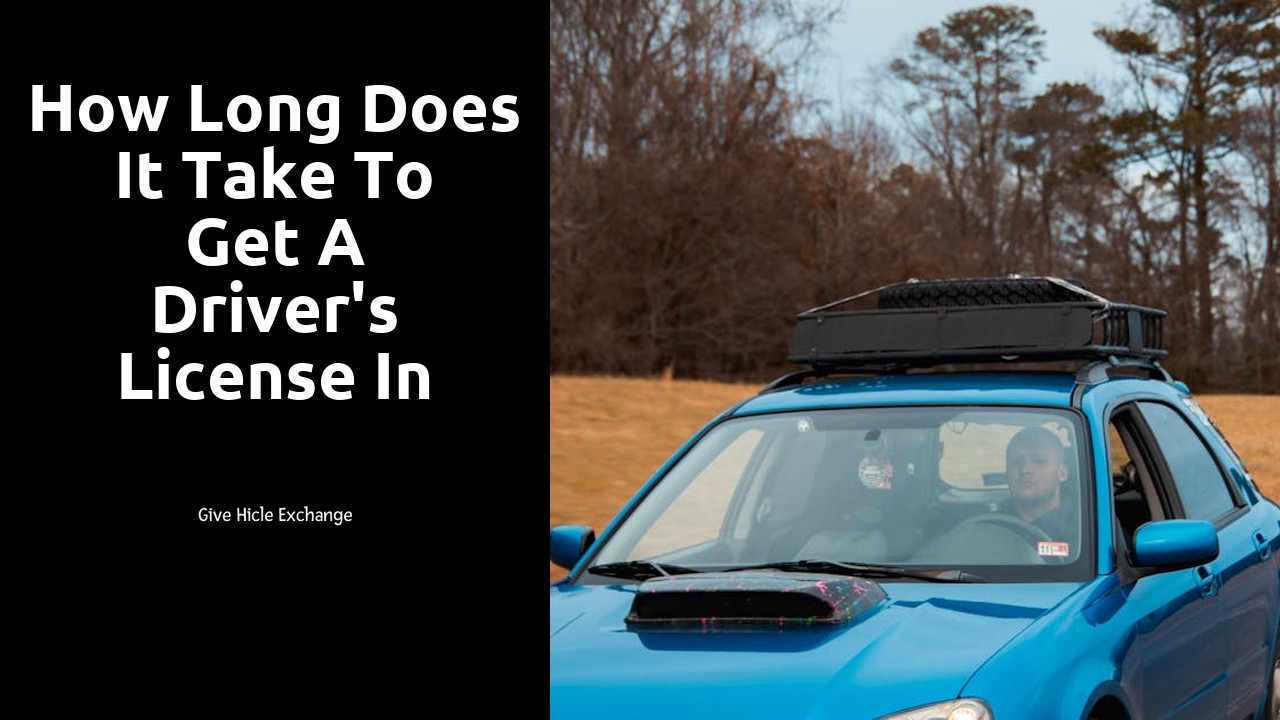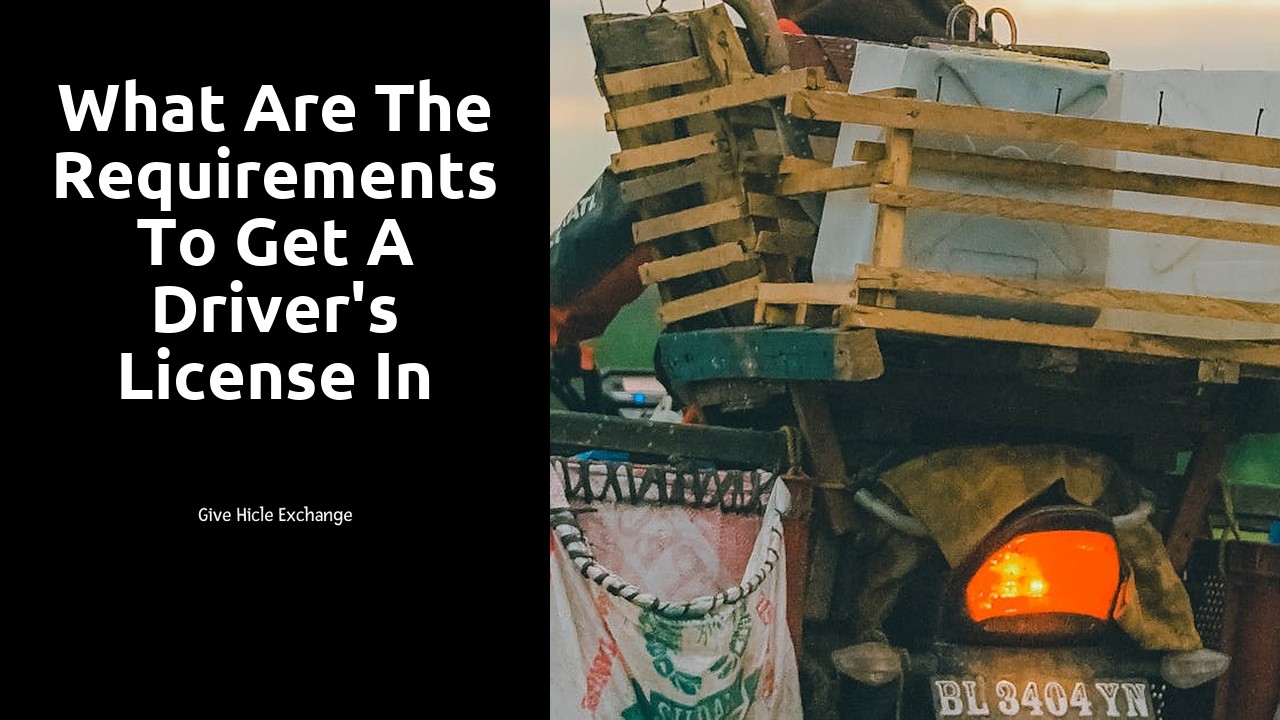
Driver licensing
Table Of Contents
Give Vehicle Exchange offers a comprehensive service for driver licensing in Canada. Our team is dedicated to assisting customers in obtaining and renewing their driver's licenses in a hassle-free manner. We provide guidance on the necessary documentation and requirements needed for the various classes of licenses, as well as help with scheduling and preparing for the required tests. Our goal is to ensure that all our customers have the proper licensing to operate a vehicle safely on Canadian roads. Trust Give Vehicle Exchange to help you navigate the complexities of driver licensing with ease and efficiency.
Consequences of Driving Without a License
Driving without a valid license in Canada can result in serious consequences. Individuals caught operating a vehicle without a license may face fines, vehicle impoundment, and even potential criminal charges. The penalties for this offence vary by province, but all jurisdictions treat it as a severe violation of traffic laws. It is crucial for all drivers to ensure they possess the proper licensing before taking to the road to avoid these repercussions.
Aside from legal penalties, driving without a license can also lead to increased insurance premiums and difficulty obtaining a license in the future. Insurance companies typically view unlicensed driving as high-risk behaviour, resulting in higher rates for those individuals. Additionally, having a record of driving without a license can complicate the process of obtaining a valid license later on. It is essential for all drivers to comply with licensing regulations to maintain their driving privileges and avoid these negative outcomes.
Legal Penalties and Ramifications
Driving without a valid license in Canada is a serious offense that can lead to severe legal consequences. Individuals caught operating a vehicle without the required driver's license may face hefty fines, potential suspension of driving privileges, and even imprisonment. The legal penalties for driving without a license are in place to ensure the safety of all road users and to uphold the laws governing road traffic in the country.
In addition to fines and potential imprisonment, driving without a valid license can also result in the increased likelihood of insurance premiums rising significantly. Insurance companies view driving without a license as a high-risk behavior, which can lead to increased costs for coverage. Furthermore, individuals caught driving without a valid license may also have their vehicle impounded, adding to the financial burdens and inconveniences associated with the offense.
Special Licensing for Commercial Drivers
Special Licensing for Commercial Drivers covers a distinct set of regulations and requirements that go beyond the standard driver's license. Commercial drivers are individuals who operate vehicles used for business purposes, such as transport trucks, buses, and taxis. Obtaining a commercial driver's license (CDL) involves additional training, testing, and scrutiny to ensure that these drivers are equipped to handle the responsibilities that come with operating larger and more complex vehicles.
In addition to meeting specific age and driving experience criteria, applicants for a CDL must pass both written examinations and practical driving tests. The written tests typically cover topics related to safe driving practices, vehicle inspection procedures, and relevant traffic regulations. Once the written tests are successfully completed, candidates must demonstrate their driving skills under the supervision of a certified examiner. The process of obtaining a CDL is designed to safeguard public safety by ensuring that commercial drivers are knowledgeable, competent, and capable of navigating the challenges of the road.
Obtaining a Commercial Driver's License (CDL)
To obtain a Commercial Driver's License (CDL) in Canada, individuals must meet specific criteria set by each province or territory. Generally, applicants need to be a certain age, typically 18 years or older, and possess a valid non-commercial driver's license. Depending on the province or territory, additional requirements such as passing written knowledge tests, vision tests, and road tests may be necessary. It is essential for aspiring commercial drivers to familiarize themselves with the specific regulations in their jurisdiction to ensure they meet all the necessary qualifications before applying for a CDL.
After meeting the criteria, applicants can typically apply for a Commercial Driver's License (CDL) at their local licensing office. The application process usually entails filling out the required forms, providing proof of identification and residency, and paying the applicable fees. Additionally, individuals may need to undergo a medical examination to ensure they are fit to operate commercial vehicles safely. Once all the requirements are met, and the necessary tests are successfully completed, individuals can obtain their CDL, allowing them to legally operate commercial vehicles on Canadian roads.
International Driver's Permit (IDP)
An International Driver's Permit (IDP) serves as a useful document for individuals who plan to drive in foreign countries. Its primary purpose is to provide a translation of your home country's driver's license into multiple languages, allowing foreign authorities to easily interpret your credentials. This can be particularly beneficial when visiting non-English speaking nations, as it helps local law enforcement and rental car agencies verify your driving qualifications quickly and accurately.
To obtain an IDP, applicants must typically submit an application form, a valid driver's license from their home country, passport-sized photos, and a nominal fee. It's important to note that an IDP does not replace your original driver's license but acts as a complement to it. Although the requirements for obtaining an IDP can vary slightly by country, the process is generally straightforward and can be completed before embarking on your international travels.
Navigating the Process for Visitors and New Residents
Visitors and new residents in Canada must adhere to the country's driver licensing regulations to operate a vehicle legally. Foreign nationals can typically use their valid driver's license from their home country for a limited period in Canada, usually around 60-90 days, depending on the province. To continue driving beyond this timeframe, individuals are required to obtain a Canadian driver's license from the respective provincial or territorial licensing authority.
The process of acquiring a Canadian driver's license can vary slightly across different provinces and territories. Generally, newcomers will need to pass a knowledge test, a road test, and a vision screening. Some jurisdictions may also mandate new residents to attend a driving education course or provide proof of driving experience. It is crucial for visitors and residents to consult the local licensing authority or official government websites to understand the specific requirements and procedures in place to obtain a valid driver's license in Canada.
FAQS
What are the consequences of driving without a license?
Driving without a license in Canada is illegal and can result in fines, vehicle impoundment, and even criminal charges. It is important to ensure you have a valid driver's license before operating a vehicle.
What are the legal penalties and ramifications for driving without a license?
The legal penalties for driving without a license in Canada can vary depending on the province or territory. Penalties may include fines, vehicle impoundment, license suspension, and potential criminal charges. It is important to adhere to the laws and regulations regarding driver licensing.
What is special licensing for commercial drivers?
Special licensing for commercial drivers refers to obtaining a Commercial Driver's License (CDL) in order to operate commercial vehicles. This license requires additional training and testing to ensure the driver is qualified to operate larger, heavier vehicles.
How can I obtain a Commercial Driver's License (CDL)?
To obtain a Commercial Driver's License (CDL) in Canada, you will need to meet certain eligibility requirements, complete training at an accredited school, and pass both written and practical exams. It is important to undergo proper training to ensure safety on the roads.
What is an International Driver's Permit (IDP)?
An International Driver's Permit (IDP) is a document that allows individuals to drive in foreign countries with their domestic driver's license. It is important to check the requirements of the country you plan to visit to see if an IDP is necessary for driving.
How can visitors and new residents navigate the process of obtaining a driver's license in Canada?
Visitors and new residents in Canada may need to go through a process to obtain a driver's license, which can vary depending on the province or territory. It is important to familiarize yourself with the requirements and procedures set forth by the respective licensing authorities to ensure compliance with the law.





